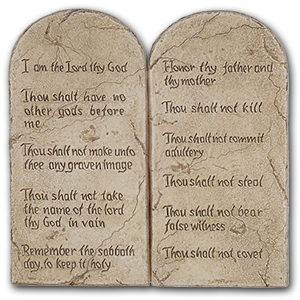The Role of the Decalogue in Public Life
 There is a long-standing debate in the United States about the role of the Decalogue in public life. This text holds a special space in the history of this nation as it served as a foundation in the drafting of the Constitution. As a result, one of the immanent questions in debates about social welfare policy, the death penalty, and a myriad of other policy issues is what role this portion of the Hebrew scripture should play in contemporary civic life. In considering this debate both the Bible and the Constitution make a strong case for why the Decalogue should not be posted in the public realm.
There is a long-standing debate in the United States about the role of the Decalogue in public life. This text holds a special space in the history of this nation as it served as a foundation in the drafting of the Constitution. As a result, one of the immanent questions in debates about social welfare policy, the death penalty, and a myriad of other policy issues is what role this portion of the Hebrew scripture should play in contemporary civic life. In considering this debate both the Bible and the Constitution make a strong case for why the Decalogue should not be posted in the public realm.
Some may argue that the Decalogue has “historical and cultural significance[1]” as a “secular code of ethics[2]” which should provide space for its prominence in the public life. However, implicit in this text is the presupposition that one believes in the Jewish/Christian God; the first four commandments are about establishing the parameters of one’s relationship with God. The Bill of Rights inhibits the government’s ability to promote or infringe upon anyone’s religious beliefs[3] and yet the display of this text has the potential to infringe upon the beliefs of all people. For those who hold this text as sacred it perverts the text to deny its value as faith statement and testimony to the grace of God. For those who belong to other faith traditions it is an intrusive imposition of one group’s beliefs onto another group.
Furthermore, implicit in the overwhelming desire to uplift the Decalogue as the common standard for maintaining social order is the notion that other faith traditions do not uplift similar, or the same, standards of morality and piety. Our faith tradition does not hold the monopoly on values of living in community, preserving human life, and family values. As a result, it is possible to develop a common standard of decency in society without invoking the language and/imagery of the Decalogue.
Conversations about posting the Decalogue in public seem to be indicative of the “hypocritical piety” condemned by the prophets[4] in the Hebrew Bible. The Decalogue becomes an idol with those who advocate for its position in civic life spouting propaganda about the text while simultaneously failing to acknowledge their lives of privilege, judgment, and bigotry are an affront to the covenantal nature of the scripture. As a result, the Decalogue becomes another border[5] that allows us to separate ourselves and hold ourselves in higher esteem that we should.
Despite my belief that the Ten Commandments should not be posted, I do believe that there is a place for them in public life. Scholars[6] offer compelling alternative perspectives on how the Decalogue should shape our understanding of how society should operate. Both authors uplift a notion that the Decalogue should point us towards care for others in community. As such the commandment not to steal is about more than someone taking your possessions, it speaks to an understanding that a person should not accumulate so much that it infringes on someone else’s ability to maintain a basic standard of living. Furthermore, Smith-Christopher makes the points that even for those who subscribe to the sacred nature of the Hebrew Bible; the Decalogue is not the sum total of those guidelines for how we are called to live in community[7]. As such we must be mindful of all the ways in which God calls us to live in community. Thus we are able to bring the Decalogue into public life by modeling behavior that harkens not only to the principles of the text but also reminds us and others of the God who initiated the covenant.
How are you faithful to the Decalogue/Ten Commandments in the ways in which you live in community?
[1]Nancy Duff, “Should the Ten Commandments Be Posted in the Public Realm? Why the Bible and the Constitution Say, ‘No’,” in The Ten Commandments, ed. Wm. Brown (Louisville: Westminster John Knox, 2004), 162.
[2] Ibid, 162.
[3] “Congress shall make no law respecting an establishment of religion, or prohibiting the free exercise thereof”.
[4] Daniel Smith-Christopher, Jonah, Jesus, and Other Good Coyotes: Speaking Peace to Power in the Bible (Nashville: Abingdon Press, 2007), 7.
[5] Ibid, xi. Smith-Christopher talks about the ways in which the borders of the United States have become an idol for people; something they worship as a “shrine to false national pride, a shrine to greed…and a shrine to American refusal to face our own racism…”
[6] Richard Horsley, Covenant Economics: A Biblical Vision for Justice for All (Louiseville: Westminster John Knox, 2009).
[7] Daniel Smith-Christopher, Jonah, Jesus, and Other Good Coyotes: Speaking Peace to Power in the Bible (Nashville: Abingdon Press, 2007), 11-15.
